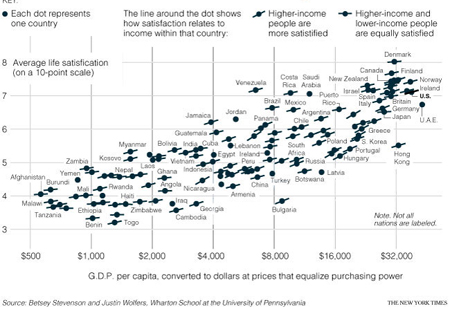Affluence is Good
[Translations: Japanese]
For the past 30 years the conventional wisdom has been that once a person achieves a minimal standard of living, more money does not bring more happiness. If you live below a certain income threshold, increased money makes a difference, but after that, it doesn’t buy happiness. That was the conclusion of a now-classic study by Richard Easterlin in 1974.
However a recent paper disputes that conclusion and shows that worldwide, afflluence brings increased satisfaction. The New York Times produced a fine graph, along with a good article, “Maybe Money Does Buy Happiness After All,” illustrating this new thesis. Richard Easterlin would like to see better data for individual countries over time, but it does seem like affluence breeds satisfaction.

My own interpretation of this research is that what money brings is increased choices, rather than merely increased stuff (although more stuff comes with the territory). We don’t find happiness in more gadgets and experiences. We do find happiness in having some control of our time and work, a chance for real leisure, in the escape from the uncertainties of war, poverty, and corruption, and in a chance to pursue individual freedoms — all of which come with increased affluence.
And as far as I can tell, while affluence has many costs, the more affluence for everyone the better.


